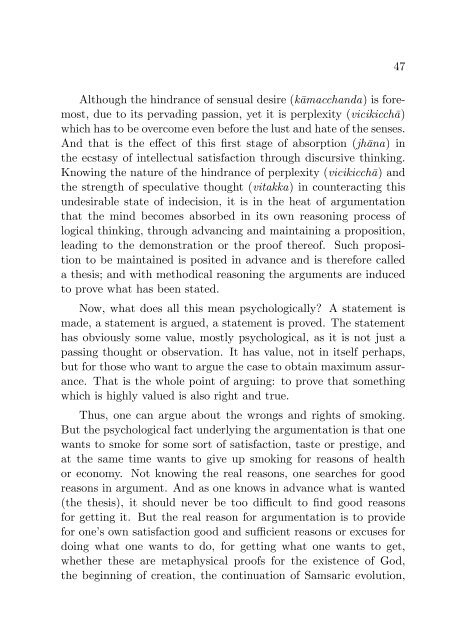Agony and Ecstasy
A comparative study of the five hindrances, together with the five states of concentration or mental absorption.
A comparative study of the five hindrances, together with the five states of concentration or mental absorption.
Create successful ePaper yourself
Turn your PDF publications into a flip-book with our unique Google optimized e-Paper software.
47<br />
Although the hindrance of sensual desire (kāmacch<strong>and</strong>a) is foremost,<br />
due to its pervading passion, yet it is perplexity (vicikicchā)<br />
which has to be overcome even before the lust <strong>and</strong> hate of the senses.<br />
And that is the effect of this first stage of absorption (jhāna) in<br />
the ecstasy of intellectual satisfaction through discursive thinking.<br />
Knowing the nature of the hindrance of perplexity (vicikicchā) <strong>and</strong><br />
the strength of speculative thought (vitakka) in counteracting this<br />
undesirable state of indecision, it is in the heat of argumentation<br />
that the mind becomes absorbed in its own reasoning process of<br />
logical thinking, through advancing <strong>and</strong> maintaining a proposition,<br />
leading to the demonstration or the proof thereof. Such proposition<br />
to be maintained is posited in advance <strong>and</strong> is therefore called<br />
a thesis; <strong>and</strong> with methodical reasoning the arguments are induced<br />
to prove what has been stated.<br />
Now, what does all this mean psychologically? A statement is<br />
made, a statement is argued, a statement is proved. The statement<br />
has obviously some value, mostly psychological, as it is not just a<br />
passing thought or observation. It has value, not in itself perhaps,<br />
but for those who want to argue the case to obtain maximum assurance.<br />
That is the whole point of arguing: to prove that something<br />
which is highly valued is also right <strong>and</strong> true.<br />
Thus, one can argue about the wrongs <strong>and</strong> rights of smoking.<br />
But the psychological fact underlying the argumentation is that one<br />
wants to smoke for some sort of satisfaction, taste or prestige, <strong>and</strong><br />
at the same time wants to give up smoking for reasons of health<br />
or economy. Not knowing the real reasons, one searches for good<br />
reasons in argument. And as one knows in advance what is wanted<br />
(the thesis), it should never be too difficult to find good reasons<br />
for getting it. But the real reason for argumentation is to provide<br />
for one’s own satisfaction good <strong>and</strong> sufficient reasons or excuses for<br />
doing what one wants to do, for getting what one wants to get,<br />
whether these are metaphysical proofs for the existence of God,<br />
the beginning of creation, the continuation of Samsaric evolution,

















